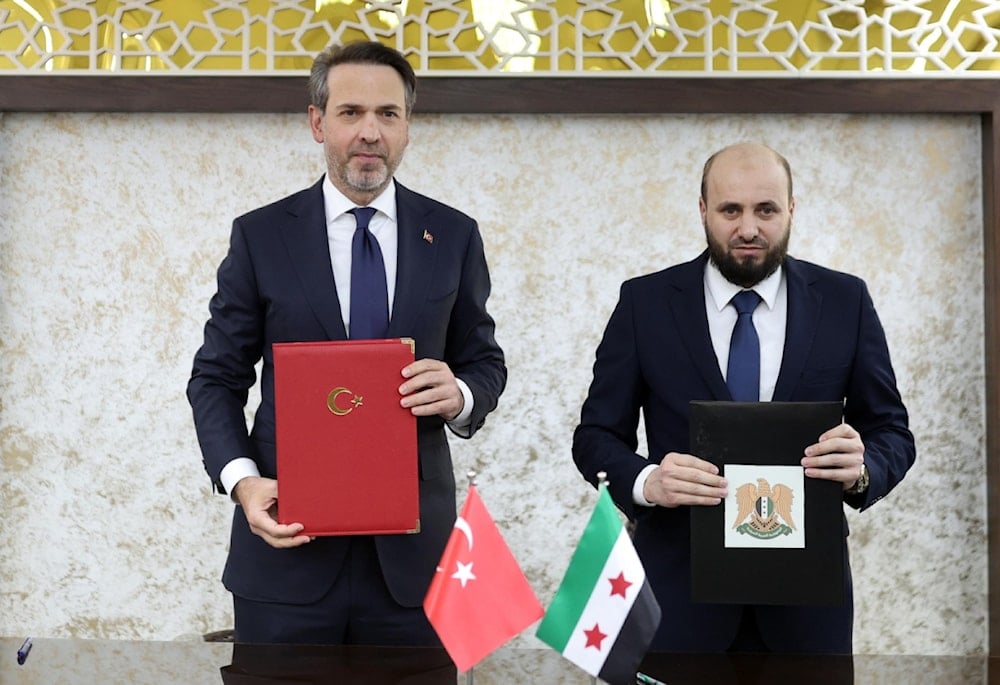Damascus, Ankara ink energy deal to supply gas, boost electricity
The agreement enables Turkish investment in Syria's mining and phosphate sectors, as well as the generation, transmission, and distribution of electricity.
-

Energy and Natural Resources Minister Alparslan Bayraktar signed a framework agreement with Syrian Energy Minister Mohammed al-Bashir in Damascus. (AA)
Syrian Interim Energy Minister Mohammad al-Bashir and Turkish Energy Minister Alparslan Bayraktar on Thursday signed a wide-ranging energy cooperation agreement, marking a significant development in bilateral economic relations focused on energy infrastructure and supply.
During a joint press conference in Damascus, al-Bashir stated that the agreement includes a protocol and general framework for coordination in various energy sectors, namely oil, natural gas, minerals, and electricity. The deal also covers joint scientific research and the exchange of technical expertise.
One of the key projects highlighted is the completion of a natural gas pipeline connecting Kilis in southern Turkey to Aleppo in northern Syria. The gas flow is scheduled to begin in June 2025, with Turkey set to supply up to 2 billion cubic meters of gas annually, expected to help generate approximately 1,300 megawatts of electricity.
The agreement also includes the finalization of a 400-kilovolt transmission line to link the Turkish and Syrian power grids, which is projected to support the import of up to 500 megawatts of electricity by early next year. A separate power line connecting Reyhanlı to Harem is under construction, with a substation expected to become operational by September.
During our visit to Damascus, we were received by the President of Syria, Mr. Ahmed Al-Shara.
, Alparslan Bayraktar (@aBayraktar1) May 22, 2025
We discussed cooperation opportunities between Türkiye and Syria in the fields of energy and mining.
We are carefully and meticulously carrying out the process with the…
In addition to these infrastructure projects, the agreement enables Turkish investment in Syria’s mining and phosphate sectors, as well as the generation, transmission, and distribution of electricity. Both sides have agreed to establish technical committees to oversee the implementation of the agreement.
Turkey also plans to supply six million cubic meters of gas per day to Syria, with the aim of significantly improving electricity availability, particularly in areas suffering from prolonged outages.
Bayraktar noted that the deal aligns with broader efforts to support the rebuilding of essential infrastructure in Syria. He confirmed that Turkish public and private companies will participate in energy sector investments, including exploration and development.
Read more: Erdogan calls on Damascus to focus on SDF deal
The agreement comes at a time of profound transformation in Syrian-Turkish relations. Following the overthrow of Bashar al-Assad in late 2024 and the rise of a new interim leadership under Ahmed al-Sharaa, backed by Hay'at Tahrir al-Sham (HTS) and supported indirectly by Turkish-aligned factions, Ankara has emerged as a dominant external actor in Syria's post-conflict landscape.
While Turkey has framed its involvement as part of a stabilization and reconstruction agenda, critics argue that its growing presence in northern Syria reflects strategic ambitions to secure economic leverage and political influence in the country's future.
This rapprochement has also become a source of regional anxiety, particularly for "Israel," which has expressed concern over the consolidation of Turkish-backed Islamist factions in areas near its sphere of interest.
Turkey and "Israel" have recently engaged in diplomatic talks concerning Syria, during which both agreed to establish a military deconfliction mechanism aimed at preventing unintended clashes between their forces operating in Syria.
Read more: 'Israel' will confront Turkey militarily if necessary: Israeli media

 3 Min Read
3 Min Read










